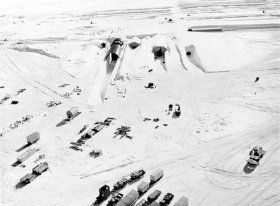Now, melting ice in a changing Arctic has remobilized some toxic waste at one Project Iceworm site and threatens to do the same at other project sites. The consequences, a new study finds, could extend far beyond those to the environment — creating unexpected cleanup costs or costs for compensating local inhabitants affected by environmental problems as well as political and diplomatic conflict between the U.S. and countries hosting the bases. Environmental problems at U.S. bases can also cause political conflict between the U.S. and countries neighboring base-hosting countries if toxic wastes migrate beyond the boundaries of the host country. Contestation over responsibility for such costs at the Project Iceworm sites has already led to the ouster of Greenland’s foreign minister.
Jeff D. Colgan, an associate professor of political science and international studies at Brown University, details the consequences of Project Iceworm in a new study published in Global Environmental Politics. Lessons learned from this case, he says, can create a framework for understanding the political, diplomatic and financial impact of environmental problems at U.S. military bases.
Read more at Brown University
Image: A U.S. Army photograph of the nuclear reactors at Camp Century in Greenland. (Credit: U.S. Army)


